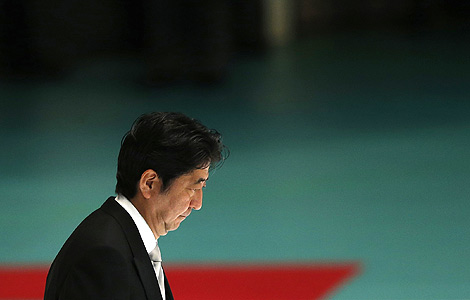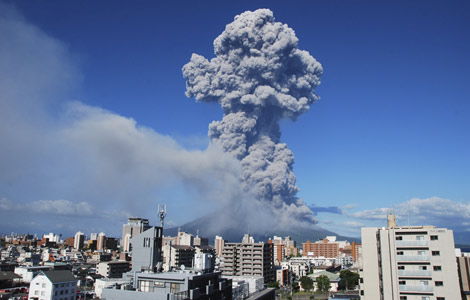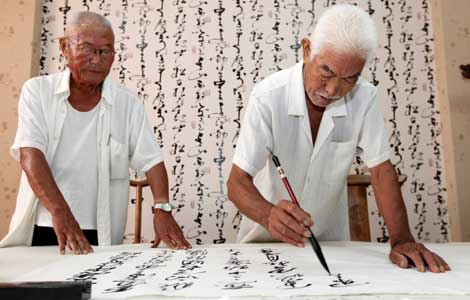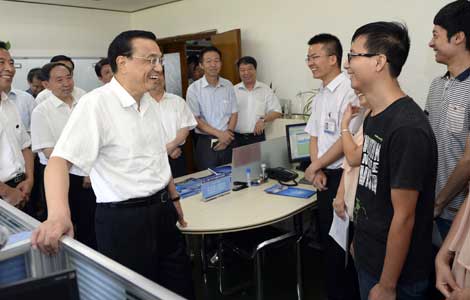Watchdog won't block Abe's military changes
Updated: 2013-08-17 06:48
(Agencies)
|
||||||||
|
 |
|
Japan's Prime Minister Shinzo Abe attends a memorial service ceremony marking the 68th anniversary of Japan's defeat in World War Two, at Budokan Hall in Tokyo August 15, 2013. [Photo/Agencies] |
Abe wants to lift Japan's self-imposed ban on exercising the right of collective self-defence, or coming to the aid of an ally under attack.
Article 9 of the U.S.-drafted, post-war constitution, if taken literally, bans Japan from maintaining a military, but it has already been stretched to allow armed forces as big as France's.
The prospect of a more assertive Japanese armed forces raises concern in many parts of the region that suffered under Japanese occupation during World War Two.
The Cabinet Legislation Bureau has for decades maintained that while Japan has the right of collective self-defence it cannot exercise it. Experts say that has been a major obstacle to lifting the ban on an expanded role for the armed forces.
Ichiro Komatsu, the head of the bureau which is known as the "guardian of law" for interpreting the constitution and reviewing bills, said it was up to Abe to make a decision.
"We give our opinions to the cabinet, prime minister and other ministers on legislation matters. But it is the cabinet that ultimately makes decisions ... and the head of the cabinet is prime minister," Komatsu, director-general of the bureau, told Reuters in an interview.
Abe put Komatsu, a career diplomat and specialist in international law, in charge of the bureau this month. Media and analysts cast the appointment as paving the way for the change.
Komatsu's predecessors have for decades opposed any change to the official view that Japan's military cannot exercise the right of collective self-defence since such an act would exceed the minimum use of force allowed under the constitution for self-defence.
US Ties
Komatsu declined to outline his opinion on the matter or elaborate on the bureau's stance. But he also stressed the importance of consistency in formulating a position.
"Several former directors-general have appeared on newspapers and said things should not change because of a personal opinion of a new director-general. I totally agree," he said. "Continuity and consistency with views we have expressed so far are important factors."
Some academics and opposition lawmakers are criticising Abe's move, which would enable the government to change Japan's security stance without revising the constitution.
Revising the constitution is difficult because amendments must be approved by two-thirds of each house of parliament and a majority of voters in a referendum.
The hawkish Abe has often expressed concern that Japan's security ties with the United States could not be maintained if Japan could not offer help to U.S. forces operating nearby when they come under attack.
Critics, on the other hand, worry that helping an ally under attack would increase the possibility of Japan being dragged into war. Even the ruling Liberal Democratic Party's junior coalition partner, the New Komeito party, is cautious about re-interpreting the constitution.
Security experts say Abe, riding high on strong support for his government, has the political capital to push the bureau into changing the interpretation.
"The Abe government has popularity, political clout and the upper hand over the media. The Cabinet Legislation Bureau would think twice about going against his intention," said Narushige Michishita, associate professor at National Graduate Institute for Policy Studies.
- Officials investigate the explosion in Japan
- Japan exports to China at lowest in four years
- Japan exports to China at lowest in four years
- War shrine is an open invitation to Japan's extremists
- Japan's Abe sends offering to war shrine
- China, S Korea condemn Japan over war shrine visit
- China Youth Voice: My view of China-Japan ties
- China urges Japan to reflect on history

 Nadal beats Isner to win first Cincinnati crown
Nadal beats Isner to win first Cincinnati crown
 Azarenka beat Williams for Cincinnati title
Azarenka beat Williams for Cincinnati title
 500th eruption of Sakurajima Volcano in 2013
500th eruption of Sakurajima Volcano in 2013
 A cocktail that's a treat for the eyes
A cocktail that's a treat for the eyes
 Private sector to care for the elderly
Private sector to care for the elderly
 Be innovative, Li tells graduates
Be innovative, Li tells graduates
 Go online to reap the harvest
Go online to reap the harvest
 Williams ends Li reign to reach first Cincinnati final
Williams ends Li reign to reach first Cincinnati final
Most Viewed
Editor's Picks

|

|

|

|

|

|
Today's Top News
Be innovative, Li tells graduates
Onus on US to improve military ties
Trustee council may be answer for reforming
40 killed as floods ravage NE China
Beijing, Moscow cooperate on floods
Home price rises slow in July
85 remain missing from Philippine ship collision
New Zealand FM to visit China, Mongolia
US Weekly

|

|







